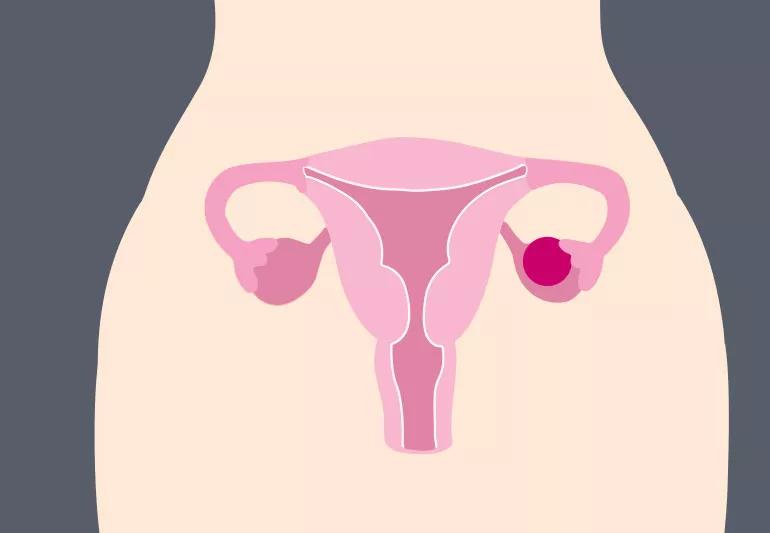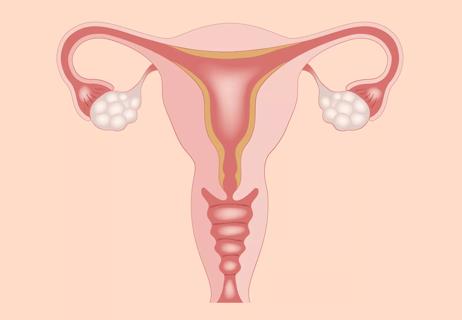Severe abdominal pain and fever are two signs

Chances are, if you’re a woman with a period, you’ve had an ovarian cyst at some point. Ovarian cysts — fluid- or tissue-filled pouches in or on your ovaries — are extremely common and usually don’t mean anything is wrong, even when they burst.
Advertisement
Cleveland Clinic is a non-profit academic medical center. Advertising on our site helps support our mission. We do not endorse non-Cleveland Clinic products or services. Policy
“Normal, physiologic cysts can grow, rupture and bleed every month, as part of your normal menstrual cycle,” says Cara King, DO, Director of Benign Gynecologic Surgery.
But then there are other ovarian cysts that aren’t so normal. These types — which Dr. King calls pathologic cysts — include dermoid cysts, cystadenomas and endometriomas.
“These are rare,” she says. “And cancerous cysts are even more rare. However, when these pathologic cysts rupture, it can be an urgent situation.”
Usually we don’t know what makes a cyst burst, Dr. King admits.
Size can be a factor. The bigger the cyst, the more likely it’ll pop, like an overfilled water balloon. Yet there can be huge cysts that are so slow-growing that they don’t rupture — as well as small, fast-growing cysts that do.
Sex and intense exercise also can cause a cyst to rupture.
“Some ovarian cysts cause pain in your lower abdomen and other symptoms,” says Dr. King. “But there’s no specific warning sign that a cyst is about to rupture.”
For many women, a ruptured cyst can be excruciating. Some say it feels like an attack of appendicitis, especially since ovarian cysts are more common on your lower right side, near your appendix.
However, the pain can be on either or both sides of your abdomen. And it may come with:
Advertisement
“If you have any of these symptoms, get to a doctor right away,” says Dr. King. “Excessive bleeding or an infection is an emergency that may require surgery or antibiotics.”
Typically, the surgery is minimally invasive. The gynecologic surgeon will use a laparoscope to find the area that’s bleeding, take out the cyst, and remove all the blood and infection-causing material.
Most of the time, a ruptured cyst doesn’t require surgery. If you can manage the pain with over-the-counter pain relievers and don’t have any signs of heavy bleeding or infection, you’ll likely recover on your own.
Your body will absorb whatever bursts out of the cyst. That varies by the type of cyst it is, but can be blood, mucus or other fluid. Dermoid cysts can have all kinds of surprising stuff in them, including hair, skin and teeth.
Absorbing the fluid from normal, physiologic cysts happens pretty quickly — within 24 hours. Other content can take longer. For example, thickened blood from an endometrioma may take weeks to absorb. And the pain can linger while unabsorbed blood continues to irritate your abdominal lining.
“Most ovarian cysts are no cause for concern,” says Dr. King. “Even if they rupture, your body usually takes care of the healing and cleanup. It’s really only when you have sudden severe symptoms that you should seek medical care.”
Advertisement
Learn more about our editorial process.
Advertisement

Most are harmless and painless

It’s important to angle it toward your rectum or back, along the natural curve of your vaginal canal

To help manage symptoms, switch to more absorbent period products, make healthy lifestyle changes and explore treatment options

Yes, you can pee with a tampon in; no, they won’t stretch out your vagina or make cramps worse!

Estrogen loss contributes to bone loss, which significantly raises your risk of osteopenia and osteoporosis

The little blue pill might help with physical arousal, but there are better treatments for low libido in women

For large breasts, wearing a bra may provide support that helps alleviate back pain — but if you’re comfortable without one, go for it!

They have no proven benefits but can cause infection, damage your pelvic floor muscles and get stuck inside you

Wearing a scarf, adjusting your outdoor activities and following your asthma treatment plan can help limit breathing problems

Your diet in the weeks, days and hours ahead of your race can power you to the finish line

When someone guilt trips you, they’re using emotionally manipulative behavior to try to get you to act a certain way